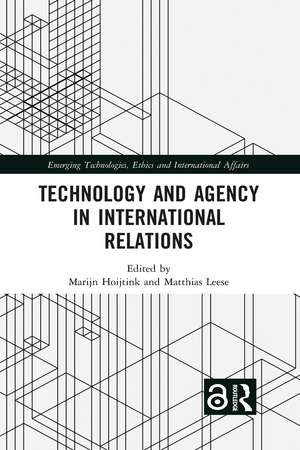Technology and Agency in International Relations: Emerging Technologies, Ethics and International Affairs
Editat de Marijn Hoijtink, Matthias Leeseen Limba Engleză Paperback – 30 iun 2021
Technology facilitates, accelerates, automates, and exercises capabilities that are greater than human abilities. And yet, within IR, the role of technology often remains under-studied. Building on insights from science and technology studies (STS), assemblage theory and new materialism, this volume asks how international politics are made possible, knowable, and durable by and through technology. The contributors provide empirically rich and pertinent accounts of a variety of technologies relevant to the discipline, including drones, algorithms, satellite imagery, border management databases, and blockchains.
Problematizing various technologically mediated issues, such as secrecy, violence, and questions of how authority and evidence become constituted in international contexts, this book will be of interest to scholars in IR, in particular those who work in the subfields of (critical) security studies, International Political Economy, and Global Governance.
| Toate formatele și edițiile | Preț | Express |
|---|---|---|
| Paperback (1) | 384.09 lei 6-8 săpt. | |
| Taylor & Francis – 30 iun 2021 | 384.09 lei 6-8 săpt. | |
| Hardback (1) | 1000.27 lei 6-8 săpt. | |
| Taylor & Francis – 25 apr 2019 | 1000.27 lei 6-8 săpt. |
Din seria Emerging Technologies, Ethics and International Affairs
-
 Preț: 194.02 lei
Preț: 194.02 lei -
 Preț: 325.15 lei
Preț: 325.15 lei - 16%
 Preț: 263.77 lei
Preț: 263.77 lei -
 Preț: 381.47 lei
Preț: 381.47 lei -
 Preț: 323.23 lei
Preț: 323.23 lei -
 Preț: 289.11 lei
Preț: 289.11 lei - 18%
 Preț: 1056.32 lei
Preț: 1056.32 lei -
 Preț: 386.99 lei
Preț: 386.99 lei -
 Preț: 364.17 lei
Preț: 364.17 lei - 17%
 Preț: 257.90 lei
Preț: 257.90 lei -
 Preț: 384.86 lei
Preț: 384.86 lei -
 Preț: 397.76 lei
Preț: 397.76 lei - 15%
 Preț: 309.10 lei
Preț: 309.10 lei - 20%
 Preț: 329.26 lei
Preț: 329.26 lei - 28%
 Preț: 821.70 lei
Preț: 821.70 lei -
 Preț: 384.22 lei
Preț: 384.22 lei -
 Preț: 382.75 lei
Preț: 382.75 lei -
 Preț: 378.92 lei
Preț: 378.92 lei - 19%
 Preț: 258.06 lei
Preț: 258.06 lei -
 Preț: 386.57 lei
Preț: 386.57 lei - 18%
 Preț: 1000.27 lei
Preț: 1000.27 lei - 18%
 Preț: 947.09 lei
Preț: 947.09 lei
Preț: 384.09 lei
Nou
Puncte Express: 576
Preț estimativ în valută:
73.52€ • 79.88$ • 61.80£
73.52€ • 79.88$ • 61.80£
Carte tipărită la comandă
Livrare economică 21 aprilie-05 mai
Preluare comenzi: 021 569.72.76
Specificații
ISBN-13: 9781032093000
ISBN-10: 1032093005
Pagini: 224
Ilustrații: 1 Illustrations, black and white
Dimensiuni: 156 x 234 x 22 mm
Greutate: 0.32 kg
Ediția:1
Editura: Taylor & Francis
Colecția Routledge
Seria Emerging Technologies, Ethics and International Affairs
Locul publicării:Oxford, United Kingdom
ISBN-10: 1032093005
Pagini: 224
Ilustrații: 1 Illustrations, black and white
Dimensiuni: 156 x 234 x 22 mm
Greutate: 0.32 kg
Ediția:1
Editura: Taylor & Francis
Colecția Routledge
Seria Emerging Technologies, Ethics and International Affairs
Locul publicării:Oxford, United Kingdom
Cuprins
Chapter 1 – How (not) to talk about technology: International Relations and the question of agency Chapter 2 – Co-production: The study of productive processes at the level of materiality and discourse Chapter 3 – Configuring warfare: Automation, control, agency Chapter 4 – Security and technology: Unraveling the politics in satellite imagery of North Korea Chapter 5 – Vision, visuality and agency in the US drone program Chapter 6 – What does technology do? Blockchains, co-Production, and extensions of liberal market governance in Anglo-American finance Chapter 7 – Who connects the dots? Agents and agency in predictive policing Chapter 8 – Designing digital borders: The Visa Information System (VIS) Chapter 9 – Technology, agency, critique: An interview with Claudia Aradau
Notă biografică
Marijn Hoijtink is an Assistant Professor in International Relations at VU Amsterdam. Her research interests include emerging security technologies and their relation to the politics of risk, militarism and weapons research, and the global circulation of security and military technologies. She has recently received a 4-years Veni grant from The Netherlands Organisation for Scientific Research (NWO) to study the politics of engineering lethal autonomous weapons systems.
Matthias Leese is a Senior Researcher at the Center for Security Studies (CSS), ETH Zurich. His research is primarily interested in the social effects produced at the intersection between security and technology, and pays specific attention to the normative repercussions of new security technologies across society, both in intended and unintended forms. His work covers various application contexts of security technologies, including airports, borders, policing, and R&D activities.
Matthias Leese is a Senior Researcher at the Center for Security Studies (CSS), ETH Zurich. His research is primarily interested in the social effects produced at the intersection between security and technology, and pays specific attention to the normative repercussions of new security technologies across society, both in intended and unintended forms. His work covers various application contexts of security technologies, including airports, borders, policing, and R&D activities.
Descriere
This book responds to a gap in the literature on International Relations by integrating technology more systematically into discussions about IR. The contributors provide empirically rich and pertinent accounts of a variety of technologies relevant to the discipline.
